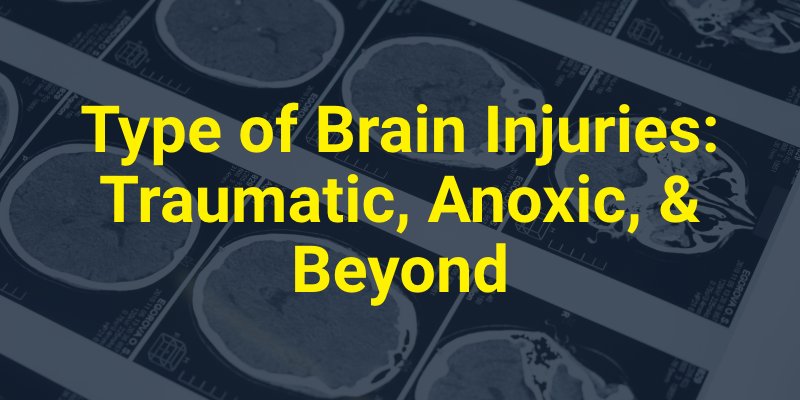Understanding various types of brain injuries can be essential, not only for medical diagnoses and treatment but also for legal matters when the injury stems from another’s negligence or an accident. In these cases, a Phoenix traumatic brain injury lawyer can help. It’s also essential to recognize the causes of these types of injuries so you can prevent them as much as possible.

A traumatic brain injury (TBI) is a result of an external force causing trauma to the head and brain. This can occur when there is a direct blow or jolt to the head, neck, or body that disrupts normal brain function (non-penetrating injury). In more severe cases, an object may penetrate through the skull, reaching brain tissue (penetrating injury).
These injuries are complex and often serious, leading to varying degrees of damage, and potentially causing temporary or long-lasting deficits. Its effect on health ranges widely, including cognitive impairments (such as issues with concentration or memory), motor function disturbances (movement and coordination difficulty), communicational challenges, and emotional regulation.
Traumatic brain injuries can arise from a variety of incidents, and understanding these common causes is crucial for both prevention and seeking legal recourse if the injury stems from someone else’s negligence:
Falling represents one of the most frequent causes, especially among children and the elderly. Falls can occur at home, in public spaces, or in workplaces. Falls from heights are particularly dangerous and likely to lead to brain injuries.
Car accidents are significant contributors to TBIs given their potential force involved. Motorcyclists may also incur TBI despite helmet use due to extreme impacts.
Contact sports like football or soccer as well as high-impact activities such as skiing or skateboarding carry risks of TBI.
Instances where individuals sustain blows from objects either at home, work, or in recreational environments can also lead to serious brain injuries.
If you’ve experienced a brain injury and believe it was a result of someone else’s negligence or intentional behavior, you should speak with a personal injury lawyer as soon as possible to determine if you have legal recourse.
An anoxic brain injury refers to a severe condition that arises when the brain’s oxygen supply is entirely interrupted. It differs from hypoxic injuries where only a reduced amount of oxygen is provided to the brain; anoxia results in no oxygen reaching the cerebral cells whatsoever.
The impact of this oxygen deprivation can have varying results, influenced by factors such as its duration and intensity. Potential symptoms include headaches, blurred or impaired vision, altered perception, challenges in articulating words and sentences properly, and disorientation.
Additionally, it can lead to several neurological impairments and cognitive deficits like memory or learning troubles, issues with motor control, and even total paralysis if severe enough.
After just a few minutes without crucial oxygenated blood, irreversible damage begins as neurons fail and die. Other potential consequences can include seizures, coma, and death.
Recognizing the causes of hypoxic and anoxic brain injuries is crucial, as early intervention can be pivotal in mitigating their damaging effects. These types of brain injuries have a variety of causes:
This blocks the airway, preventing essential oxygen from being delivered to the bloodstream—and by extension, to the brain.
Certain substances, like opiates, can depress normal respiratory functions, leading to a diminished oxygen supply to the brain.
Insufficient blood pressure fails to supply adequate oxygen-rich blood to cerebral tissues.
When the heart suddenly stops beating effectively, blood flow ceases, destabilizing the delivery of vital nutrients and oxygen to the brain.
In these types of incidents, water flooding into the lungs impedes one’s ability to breathe correctly thereby reducing the amount of oxygen that is available for the brain.
This toxic gas interferes with the blood’s delivery of oxygen throughout the body, including in the brain.
Understanding these causes is a fundamental part of both prevention and effective response to an injury.
The repercussions of anoxic and hypoxic brain injuries can be enduring, considerably influencing the quality of life for the affected person. Long-term effects are determined by factors including injury severity, treatment rapidity, overall health before the injury, as well as the location of the brain damage.
With a mild or brief period of oxygen deprivation (hypoxia rather than anoxia), patients often see significant recoveries—sometimes back to their baseline before the injury.
For longer periods without adequate oxygen, there can be catastrophic outcomes such as permanent cognitive dysfunction manifesting as memory problems, issues with speech and language, changes in personality and behavior, headaches, and other troubling symptoms.
When another party’s actions lead to your injury, you may be entitled to recover damages meant to offset the various effects this incident has had and continues to have on your life. Compensation can be comprehensive, addressing numerous facets of how the injury disrupted both tangible and intangible aspects of daily living:
These cover tangible losses like medical expenses from immediate care all the way through any ongoing rehabilitative treatments, loss in earnings if you were unable to work or if your future earning potential has been impacted, and the cost of adapting living spaces to accommodate the injury.
Non-economic damages compensate for the less quantifiable effects of your injury. This includes pain and suffering, emotional distress, loss of enjoyment in life, or decreased quality of life due to permanent disability or disfigurement resulting from the injury.
In cases where a responsible party acted extremely negligently, you might be awarded punitive damages. These serve to punish wrongful behavior and are intended to act as a deterrent against similar conduct. In Arizona, the standard for awarding punitive damages is if the defendant acted with an “evil hand and evil mind.”
If you have questions about any type of brain injury or what you need to do to recover appropriate compensation, contact us today to schedule a free consultation.